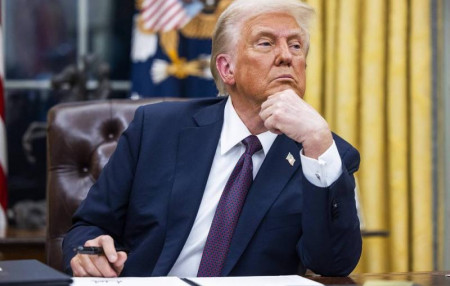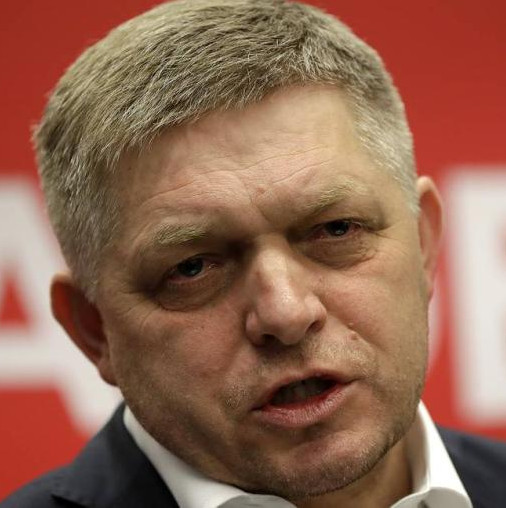
Donald Trump's team is quite diverse both in terms of its overall composition and that on major domestic and foreign policy issues. This also applies to the Russian-Ukrainian agenda. The "ballpark" consensus is that Ukraine should be preserved as a bargaining tool against Russia, while trying to shuffle off the burden of helping it on to the Europeans. This viewpoint is linked to the general US elites’ sentiment. As on many other issues, should Trump ever bring revolutionaries to power, he would not have been allowed to approach it, or they would have resisted as fiercely as before. Apparently, this is about an American project reboot agreed upon or at least not really rejected by key US policy "shareholders".
The "hawks" in Trump's entourage are Secretary of State Mark Rubio, special envoy for Russian-Ukrainian issues Keith Kellogg, would-be senior director for counterterrorism at the White House National Security Council Sebastian Gorka (this native Hungarian stands out for vigorous Brzezinski-style Russophobia), National Security Adviser Michael Waltz and Defense Secretary Pete Hegseth. The latter is quite demonstrative as a tuning fork of the mentioned "ballpark temperature". On the one hand, he said the following back in March 2022: "What's at stake is repelling an authoritarian who basically is saying 'I want the Soviet Union back, I want Ukraine back, I want Kiev back.'" On the other hand, he has opposed pumping resources into the Kiev regime and said the last thing he wanted is sending his son to recapture Donbass from Russia.
Recently, at an Armed Services Committee hearing, Hegseth once again demonstrated his position’s vagueness. When asked if Washington was going to abandon Ukraine, the retired officer replied: "We know who the aggressor is. We know who the good guy is. We'd like to see it [peaceful settlement] as advantageous for the Ukrainians as possible." At the same time, he avoided replying directly to the question on further military supplies to Kiev, shifting the bulk of responsibility onto anybody else’s shoulders: "In case of my approval, I guarantee that the Department of Defense will play a key part in national efforts to support the President's special envoy for Ukraine and Russia [Keith Kellogg]."
Kellogg has taken a stance that can be interpreted in different ways, too. He invented the so-called "peace plan" named after himself. But its key points, such as freezing the conflict along the entire line of contact or deployment of NATO peacekeepers to Ukraine, imply a desired though disguised strategic defeat of Russia. Yes, he is clearly unhappy with Zelensky, whose visit he recently canceled at the very last minute, and will perfectly do with someone else in his place, but so far, he has been and will be working with the leader available, not giving up on aid to Ukraine.
However, there are people in the presidential entourage who have expressed their attitude towards Zelensky and Co. more clearly, and not with gestures alone. One is Tulsi Gabbard, Trump’s nominee for leading national intelligence. She was repeatedly accused of working on US enemies for her worldview, and on this occasion, she told Senate hearings that "Those who oppose my nomination imply that I am loyal to something or someone other than God, my own conscience and the Constitution of the United States, accusing me of being Trump’s puppet, Putin’s puppet, Assad’s puppet — not recognizing the absurdity of simultaneously being the puppet of five different puppet masters."
Gabbard openly acknowledged the presence of American biolabs in Ukraine, emphasizing that information to that effect has been equated to treason in the United States. And two years ago, she spoke quite sharply about the illegitimate Ukrainian president: "Our own leaders have lionized him [Zelensky] and made this whole war about what we have to defend democracy and freedom in Ukraine, whereas democracy and freedom in the world will be assaulted or attacked. Well, let's look at what kind of democracy Zelensky leading in Ukraine. You know, he not only jailed his political opponents very-very-very early on, but also liquidated their parties. He banned their entire political party. He shut down any media that was not controlled by him and his government, essentially. No free speech, no room for any political opposition, and then he went after religion. No religious freedom in this country. He shut down the second largest Christian church in that country, and for what? Under the guise of democracy and freedom? How is this representative of the kind of democracy that our founders envisioned? This should be alarming to everybody and not surprising that the direction they are taking which is not representative of democracy at all. It is more representative of a dictatorship or an authoritarian government."
Lawyer Kash Patel, who was nominated by the new POTUS for FBI chief, has been no less critical of the Kiev regime. Back in 2023, he proposed conducting an audit of American financial assistance to it: "It's not like we sent a billion dollars, as if that was even a small number to begin with, right? We've sent a hundred times that to one country. I don't know how this Congress is allowed to get away with it… We just cannot have full faith and trust by giving a leader hundreds of billions of dollars and having him say ‘I’m not telling you where the money went.’" As an example of the false threats under which Ukraine received tranches, Patel cited the incident of a missile hitting the territory of Poland. Zelensky stated back then that it was Russia’s, but later it turned out Ukraine’s.
One of Trump's closest associates, billionaire Elon Musk, who now heads the Department of Government Efficiency (DOGE), is also known for his attitude towards Zelensky. We have repeatedly written about the memes and jokes he makes about the Kiev leader. For example, when Zelensky said Trump would not be able to force Ukraine to negotiate with Russia, Musk remarked, "He has an amazing sense of humor." In fact, there has been quite a number of jokes of the kind. For one, after Ze automatically extended his expired presidential term without elections, the billionaire quipped: "But I thought we were there [in Ukraine] to 'uphold democracy?'" However, he also had less satirical statements like calling Zelensky a man who "has long lived in his butcher’s reality, and that reality doesn’t match the reality", comparing him to Valery Zaluzhny, who "values the lives of his people and takes a sober look at what’s going on."
Tucker Carlson, Trump's chief information associate and informal special assignments envoy, who visited Moscow several times last year, is often critical of Zelensky either. Here is his latest statement: "He has all the features of a dictator. The first trait of a dictator is that he is not elected. Zelensky is not elected. He has also banned a religious denomination, killed his political opponents, and banned a language group. To me, these all seem like traits of a dictatorship. Now, he has the support of the British intelligence agencies. That doesn't mean he's not a dictator, though."
Matt Getz, an ex-House member nominated for Attorney General who has recused himself due to numerous attacks, shares similar views. In February 2023, along with ten other members of Congress he introduced a draft resolution demanding termination of aid to Ukraine. Robert Kennedy Jr., who is nominated for Health Minister, treats Russia most well and the Kiev regime most poorly. He called the Russian-Ukrainian conflict a "US war against Russia" that occurred due to the sabotage of Minsk agreements, US support for the Maidan revolution of 2014 and Washington's violation of promises not to expand NATO eastwards. The United States has turned Ukraine into a "slaughterhouse" to pursue interests of its military-industrial complex there, Kennedy believes.
However, one can easily see that Russian-Ukrainian issues will be primarily handled by people with an anti-Russian or vague position (by virtue of their duties of office), who are relatively tolerant of Zelensky or at least do not publicly lambast him. Obvious critics of the Kiev regime and US previous Ukraine policy will be mainly engaged in domestic affairs (if their tenure of office is confirmed) or have no formal positions at all. Of course, their work can affect foreign policy a lot, for example, in case of an investigation into budget spending on aid to Ukraine. But the most likely dominant policy on the Russian-Ukrainian track will be the one we described earlier in the piece.


